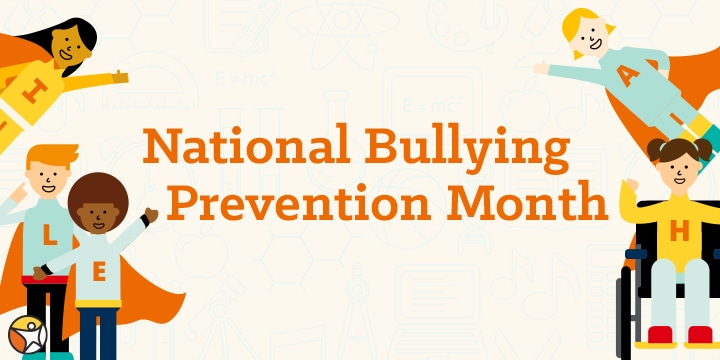How Much Is Online School?
by Trey Edgington
by Beth Werrell
3 min to readHere’s the good news: Everyone can play a role in stopping bullying. And there’s no better time to get started than right now. October is National Bullying Prevention Month, established to raise awareness of and educate communities about the issue of bullying.
Bullying is a serious issue. For far too long, many people considered the behavior to be a childhood rite of passage, something to be endured to build backbone. But no longer. Bullying is repeated, unwanted verbal or physical aggression designed to embarrass, humiliate, or intimidate another person. Learn to spot the warning signs of bullying.
But you can do something about it! Whether you’ve been a target of a bully or not, you can probably imagine what it feels like to be singled out and made the butt of jokes, or worse. Instead of passively standing by when you see bullying behavior, you can be an upstander!
An upstander is someone who speaks up or acts on behalf of a person being bullied. An upstander can be someone who gets help from an adult or another authority figure, listens, lends a hand, or takes other actions.
You can also teach your child to be an upstander. Connections Academy® created a team of superheroes called The Upstanders as examples of the behaviors and attitudes that can help put a stop to bullying.
You can teach your child The Upstanders’ way, like:
Alex accepts people for who they are and believes that differences add to his overall understanding and enjoyment of the world. Alex is happy to meet new people and has an open mind. Alex helps friends feel comfortable and accepted so that they are less likely to feel isolated and bullied.
You can teach your child to be accepting of new people like Alex. For example, if a new student joins your child’s classroom this year, encourage him or her to get to know the new student.
Inez wants everyone to join the group, get along, and be friends. Her day gets a little brighter when people come together and everyone is having fun. By including new people, she is helping to protect them from being alone and singled out by bullies.
Like Inez, your child can include everyone in group activities, at lunch or parties.
Luis is a good listener and eases his friends’ troubles by lending an ear. He believes that being present and allowing a friend to share his or her troubles is what a good friend does. Luis can be counted on to answer his phone and return text messages.
Listening is a great skill that your child can use to help a friend in need. By listening, your child can help a friend find a solution or get an adult involved if needed.
Hana the Helper enjoys lending a hand because it makes her feel good. She is optimistic and tries to spread positivity and good deeds wherever she goes—especially for a friend in need!
There are many ways that your child can be a helper. A helper can alert an adult, using his or her voice to speak out against bullying. Spreading kindness is a superpower that benefits everyone.
Elijah likes cheering friends on! He likes making sure others know they have his support, and he’s willing to put himself out there in a vocal way to make everyone feel welcome and safe!
Elijah’s superpower is that he makes others feel powerful. Your child can do the same by providing encouragement for a friend in trouble.
To find out more about Connections Academy, the free online public school for grades K–12, and how we support social development in a virtual environment, check out the socialization and community page on our website.
by Trey Edgington
by Connections Academy
by Connections Academy
